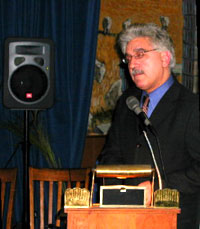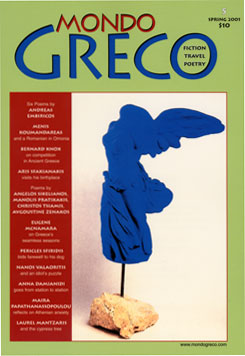
|
A Review by Dino Siotis
Keeley, a friend and colleague of George Seferis, Odysseus Elytis and Yiannis Ritsos, entered the soul of Greece like no one before him. He entered it not as a visitor, but as a native -- Keeley was born and raised in pre- and postwar Thessaloniki, and is an honorary Greek citizen. He was molded by Greek poetry and learned very early about the habits and peculiarities of the poets and their associates during the Greek literary decade of 1937-1947. His book becomes the mirror of that decade. Its nine chapters ("The First Eden," "Almost Blessed Island," "The Mythmakers," "Travelling Through the Light," "About Gods, Demigods and Demons," "The Garden of Earthly Pleasures," "Sailing Out of Paradise," "Eden on Fire" and "Emerging Out of the Ashes") reflect all the significant historic events and exude the literary aroma of that particular era. The reader gets a glimpse of Lawrence Durrell's and Henry Miller's first contact with Greece (later on it turns into a love affair), the era before the German Occupation, the Metaxas dictatorship, and the Civil War. The history and the myth of the "New Letters" era is supported by George Katsimbalis and the poets Angelos Sikelianos, George Seferis, Yiannis Ritsos, Andreas Embirikos, Nikos Egonopoulos, Odysseus Elytis, Nikos Gatsos, Dimitris Antoniou and Nanos Valaoritis. In addition we catch glimpses of Nikos Hatzikyriakos-Gikas, Constantine Tsatsos, Andreas Karantonis, Ioanna Tsatsou, Georgios Theotokas, Patrick Leigh-Fermor and James Merrill, who represent the 1930s generation in all its magnificence. Lawrence Durrell got to know both George Seferis and George Katsimbalis. In his book Spirit of Place, Durrell describes Katsimbalis' residence in
Falling in Love with Greece Durrell discovered Katsimbalis in 1935, a few years before Miller arrived in Greece. In July 1939, when Miller came to Greece, Durrell introduced him to Katsimbalis and his friends George Seferis, Nikos Hatzikyriakos-Gikas, Dimitris Antoniou, Dr. Theodore Stephanides, Seferis' sister Joanna and her husband Constantine Tsatsos. Henry Miller had always been attracted to Greece, and now he learned several things from a Greek college student on board the ship that carried both of them to Piraeus. Miller learned that Greeks are not only "enthusiastic, extraordinary and passionate people" but also "endowed with the most human elements, such as contradiction, confusion and madness." Miller, like Durrell before him, found his "paradise" in Greece. In a matter of hours, Keeley writes, Miller became a typical Athenian. And what turned him into an Athenian? Nothing more a visit to the Acropolis -- something that is done by grade students and lovers who want to see the full moon on a starlit night and apparently not something done by contemporary Athenians. Miller cast his first glance on the "Greek paradise" at Zappeio Park. "There is no other park in my mind that resembles the Zappeio," writes Miller. "It gives the feeling that you are looking at a canvas or you are dreaming of a place you would like to be but can never find." Miller learns to love Greece and the Greeks instantly at Zappeio, looking at lovers in the darkness quenching their thirst with water and kisses, says Keeley. It is in Zappeio that the American author becomes acquainted with the Greek temperament. According to Keeley, the Greek artist Malliarakis who lived in Paris prompted Miller to go to Greece: "Miller," he said, "you will like Greece. I am certain of that." The reality is somewhat different. An eighteen-year-old American, Betty Gordon (Elizabeth Ryan), lived in Paris and had become Miller's lover. She had travelled to Greece when a Frenchman made available to her his home in a village on the island of Andros. Today Betty Gordon, advanced in age, lives at a cheap motel somewhere in New Hampshire, playing chess with a contrived opponent. She still remembers the days of glamour with Miller in Europe. It is an omission that there is no mention of her at all in Keeley's "Inventing Paradise." Betty Gordon brought Miller to Greece and there are references to her in all of Miller's non-fiction works. A further observation is that the acronym AMOGE does not mean "American Mission for Observing the Greek Elections" but "Allied Mission for Observing the Greek Elections." Chronicle of a Legendary Era One may find the book in the Literary Criticism section of any bookstore; however, we could say that Inventing Paradise is not only criticism but many other things as well. It is a chronicle of a renowned era in Greece that many people still remember. The book is also Keeley's personal memoirs, since the author personally knew most of the protagonists of Inventing Paradise. Finally, Inventing Paradise is in part a historical survey of Modern Greek literature. All these elements are depicted with love and passion and they are painted with colors that only Keeley's pen could create for us. Historic events, travel narrative, and an abundance of Greek poetry (translated into English by the author) fill this book. Real myth unfolds against the background of Greek modernism. Keeley's observations about the Greek temperament, the Greek society and the negative results of massive migration to big cities are objective and accurate. With Inventing Paradise Keeley has raised the literary element of Modern Greece to a higher echelon. The author refers to a bygone era. But the aroma of that period can be rediscovered by those who want to find it -- not only in cafes and pubs in the center in Athens, or among various literary groups in Athens and Thessaloniki, but also in small provincial towns on the mainland and Aegean islands, or in some forgotten taverns in Kesariani and Exarheia. The author, toward the end of his Inventing Paradise, rewards his readers with an overview of Durrell's and Merrill's literary legacy -- their contribution to raising modern Greek literature to an international level. Keeley writes: "The generation of authors that followed Miller and Durrell are indebted to them, because they provide new access for them to appreciate Greece. The Peloponnesus in Kevin Andrews' and Patrick Leigh-Fermor's books is deeply rooted in the modern history of the area. It gives an account of the war that brought fright to the inhabitants of its villages, brings up the idiomatic uses of the Greek language and also introduces the traditions of the area. The various portraits of Greece that are depicted by Philip Sherard's pen underline the religious and poetic traditions that define the lively culture of the country. All of these American and British authors who came during the war, or immediately after it, were something more than visitors. Whether they liked it or not they 'married' the country, they experienced romantic eras and eras filled with disappointments, and they also sampled renewal in that land, whilst remaining steadfast to their beliefs and opinions. Their story is another story and part of it is mine." Someone must undertake the task of giving an accurate account of the history of the next generation of authors and poets. Greek poetry has roots that go very deep into history, and, at the same time, these roots have sprouted throughout the world. Inventing Paradise shines like a diamond in the tradition of Greek literature. And as we know, diamonds live forever. |
Posted December 2003 2000 © Hellenic Communication Service, L.L.C. All Rights Reserved. |


